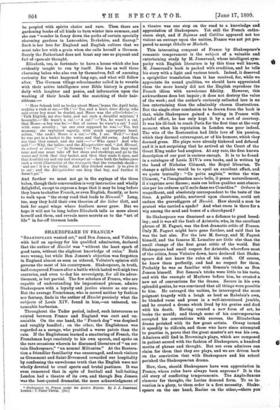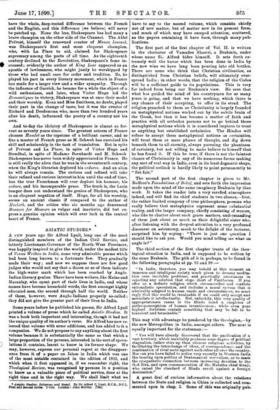SHAKESPEARE IN FRANCE.*
"SHAKESPEARE wanted art," said Ben Jonson, and Voltaire, with half an apology for his qualified admiration, declared that the author of Hamlet was " without the least spark of good taste, without the slightest knowledge of rules." Both were wrong, but while Ben Jonson's objection was forgotten in England almost as soon as uttered, Voltaire's opinion still governs the most of his countrymen. Shakespeare, in truth, half-conquered France after a battle which lasted well-nigh two centuries, and even to-day his sovereignty, for all its adver- tisement, is but partial. The few scholars of France, who are capable of understanding his impassioned phrase, admire Shakespeare with a loyalty and justice sincere as our own. But the average Frenchman, who is moved neither by fashion nor fantasy, finds in the author of Hamlet precisely what the subjects of Louis XIV. found in him,—an untamed, un- tameable barbarian.
Throughout the Tudor period, indeed, such intercourse as existed between France and England was curt and un- amiable. On the one hand, the " French dog" was despised and roughly handled ; on the other, the Englishman was regarded as a savage, who prattled a worse patois than the cats. If the Englishman learned a smattering of French, the Frenchman kept resolutely to his own speech, and spoke on the rare occasions wherein he discussed literature of "nn cer- tain Shakespeare," "nn nomme Miltonius." At the Restora- tion a friendlier familiarity was encouraged, and such visitors as Grammont and Saint-Evremond rewarded our hospitality by confessing the unwelcome truth that the English were not wholly devoted to cruel sports and brutal pastimes. It was even rumoured that in spite of football and ball-baiting London had a theatre of its own, and though Ben Jonson was the best-quoted dramatist, the mere acknowledgment of n Shakespeare in Franca under the Ancien ReliMe. By .1. J. Tosserand. London: T. Fisher Unwin. 1215.] a theatre was one step on the road to a knowledge and appreciation of Shakespeare. Yet still the French enthu- siasm slept, and if Sejanus and Catiline appeared not too violent an outrage upon the unities, France was not yet pre. pared to accept Othello or Macbeth.
This interesting conquest of France by Shakespeare's romantic temperament is the subject of a valuable and entertaining study by M. Jusserand, whose intelligent sym- pathy with English literature is by this time well known. M. Jusserand's book is packed with erudition, and he tells his story with a light and various touch. Indeed, it deserved a sprightlier translation than it has received, for, while we appreciate its sound qualities, we should have appreciated them the more keenly did not the English reproduce the French idiom with unwelcome fidelity. However, this awkwardness does but impair ; it does not destroy the value of the work ; and the author's curiously collected lore is no less entertaining than the admirably chosen illustrations. But the single clear conclusion to be drawn from the book is that, while Shakespeare gained a footing in France with painful effort, he has only kept it by a sort of courtesy. It was his ill-luck to reach Paris for the first time at the very moment when his reputation in London was poor indeed. The wits of the Restoration had little love of his passion, which they deemed extravagant, or of his humour, which they deemed gross. His plays were already tinkered and defaced and it is not surprising that he arrived at the Court of the Great King under bad auspices. At any rate, the first known description of our poet is curious enough. It is to be found in a catalogue of Louis XIV.'s own books, and is written by the hand of Nicholas Clement, the Royal librarian. To change a syllable would be to spoil an excellent effect, and we quote textually : " Ce poste anglois," writes the wise Clement, "a l'imagination asses belle, it pense naturellement, it s'exprime avec finesse; mais ces belles qualitez sont obscur- cies par lea ordures mele dans sex Comedies." Ordures is magnificent, and absolutely correspondent to the taste of the time. A polite public, nurtured upon classicism, could not endure the gravediggers of Hamlet. How should a man be genteel who carried a spade? And what room is there for a wig among the mud and bones of a churchyard ?
So Shakespeare was dismissed as a defiance to good breed- ing ; and it was all the fault of Aristotle, who, in the excellent phrase of M. Faguet,' was the first dramatic critic of France. Only M. Faguet might have gone further, and said that he was the last also. For the late M. Sarcey, and M. Fagnet himself, and the famous M. Lemaitre are little else than the small change of the first great critic of the world. But Shakespeare had small respect for Aristotle, wherefore most of the critics, from Voltaire down, have declared that Shake- speare did not know the rules of his craft. Of course, he knew them perfectly, and had no respect for them. Probably he was as familiar with Seneca's tricks as Ben Jonson himself. But Seneca's tricks were little to his taste, and with the example of Marlowe before him, he created a new set of conventions for the drama. Secure in his own splendid genius, he was convinced that all things were possible to him. He outraged the unities, he interrupted the most poignant tragedy with a laugh as loud as Rabelais's own, he blended verse and prose in a well-intentioned jumble, and he created a drama which lived by his genius and died with his death. Having created a new form of art, he broke the mould; and though some of his contemporaries accepted his conventions with success, the Elizabethan drama perished with its few great artists. Otway turned it speedily to ridicule, and those who have since attempted to practise it, prove that the great master's art was his own. Admirers still find in Browning's plays, which are composed in patient accord with the fashion of Shakespeare, a hundred merits of phrase and thought. But not even admirers can claim for them that they are plays, and we are driven back on the conviction that with Shakespeare and his school perished the Shakespearian drama.
How, then, should Shakespeare have won appreciation in France, where rules have always been supreme ? It is the old story of conflicting temperaments. The Anglo-Saxons clamour for thought, the Latins demand form. To us in- vention is a glory, to them order is a first necessity. Shake- speare on the one hand, Racine on the others—there you have the whole, deep-rooted difference between the French and the English, and this difference (we believe) will never be patched up. None the less, Shakespeare has had many a brave champion on the other side of the Channel. The Abbe Prevost, himself the renowned creator of Manon Lescaut, was Shakespeare's first and most eloquent champion, who, with La Place to aid, claimed for Shakespeare supremacy among the poets of all time. As the eighteenth century declined to the Revolution, Shakespeare's fame in- creased ; evidently the author of King Lear appeared as an apostle of lawlessness, who might justly be worshipped by those who bad small care for order and tradition. So, he played his part in every literary movement, which in France has made for a larger view and a wider sympathy. Through the influence of Garrick, he became for a while the object of a wild enthusiasm, and later, when Victor Hugo led the Romantigues to victory, Shakespeare was at once their model
and worship. Kean and Miss Smithson, no doubt, played their part in the change of taste, but it was the creator of Richard and Desdemona who, more than two hundred years after his death, influenced the poetry of a country not his own.
And to-day the idolatry of Shakespeare is almost as fer- vent as seventy years since. The greatest actress of France chooses Hamlet as the topstone of a brilliant career, and so fine a master of French prose as M. Schwob has exercised his skill and scholarship in the task of translation. But in spite of Prevost and La Place, in spite of Victor Hugo and Stendhal, in spite of Madame Bernhardt and M. Schwob Shakespeare has never been widely appreciated in France. He is still really the alien that he was in the seventeenth century, when the King's librarian deplored his ordures. And an alien he will always remain. The curious and refined will take their refined and curious interest in him until the end of time, but the true Frenchman will ever deplore his humour, his ordure, and his incomparable prose. The truth is, the Latin temper does not understand the genius of Shakespeare, who is an eloquent negation of itself. Hugo, for all his worship, seems an ancient classic if compared to the author of Macbeth, and the critics who six months ago denounced Measure for Measure as vulgar and inartistic, did but ex- press a genuine opinion which will ever lurk in the central heart of France.







































 Previous page
Previous page